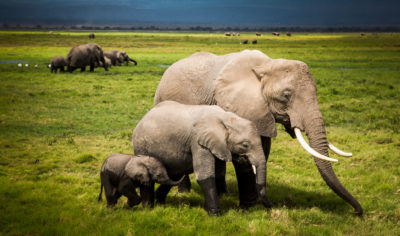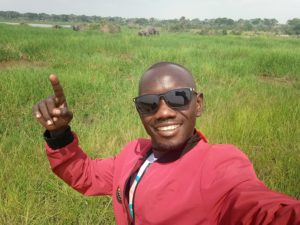
Conflict with humans is the largest growing threat to elephants in their natural habitat. As both human and elephant populations grow, the need for resources pushes us closer together, often resulting in confrontation. This can include injury and death on both sides, property damage, clashes over water, and destruction and eating of crops by elephants, known as “crop-raiding”.
Last World Elephant Day, we introduced our “smelly” elephant repellent as a natural, non-violent approach to reducing elephant crop-raiding. We are excited to share that the trials running in Uganda over the past three years have been very positive, with over 80% of crop raids being prevented by the smelly repellent. People’s attitudes towards elephants are also improving, as farmers now feel that they have a way of diverting the animals away from their gardens.
WildAid is fortunate to be working and partnering with many dedicated people across elephant range countries to continue to test the smelly repellent’s effectiveness and to develop a mechanism that will enable us to get the product to as many people as possible who need it. Spearheading this initiative are WildAid consultants Maz Robertson, our East Africa and Human-Wildlife Coexistence Rep, and Opira Godfrey, our Ugandan field-based Human-Elephant Coexistence Consultant. On the anniversary of Opira’s first year with WildAid and on World Elephant Day, Maz poses the questions.
Maz: Can you tell me what drives you to work in wildlife conservation and how you got into this career?
Opira: I have a lot of love for nature and wildlife, which I think stems from growing up in a village near Uganda’s largest national park, Murchison Falls. I’m also really passionate about community work and am a people person; I speak a number of Ugandan languages and enjoy interacting with different people, bringing them ‘round to my way of thinking. It’s these two things combined that drove me into a career in community conservation, even though I had other offers, including a job in the upcoming oil sector in this region. Helping people to raise their living standards whilst coexisting with wildlife really motivates me to do this work.
Maz: When did you first become aware of human-elephant conflict, and what has been your most memorable experience with elephants?
Opira: I started working on human-elephant conflict in August 2020 when I joined WildAid. Before that I had been working in another district near the park, improving access to sustainable livelihoods and helping people set up wildlife-friendly enterprises. The most interesting thing I’ve learned since working more closely with elephants is that when an elephant has a bad experience, for example eating some crops that have been sprayed with the smelly repellent, they will remember this for a long time, and not come back to the place where they had that experience. I have had farmers tell me that they have seen elephants spit out repellent-sprayed leaves, and not come back at all afterward!
Maz: What were your first impressions of the smelly elephant repellent when you started this job a year ago?
Opira: I have to say that when I heard about mixing together all of these natural and locally grown items – like ginger, garlic, chili and neem leaves – to produce something smelly that scares elephants away, it sounded a little funny but intriguing! I had heard the feedback that you and our former colleague, Ernest, were getting from the farmers, so I had reason to believe that it worked, but I was definitely interested to hear directly from the farmers themselves. After that, my first thought was that I needed to catch up and learn how to make this stuff and keep supporting the people in this community, Latoro, which really suffers from elephant crop-raiding twice a year when harvest time approaches.
Maz: What would you say is the most challenging part of your role?
Opira: The most challenging part of this job – and any conservation work in my experience – is diplomacy. There are so many views to take into consideration: people who think that what you’re doing is right, is wrong, is a waste of time, or that you should be working harder and faster. At the moment what we are able to do is limited to just 30 farmers, but demand for the smelly repellent is really high. I have to be very diplomatic to manage this and encourage people to be a little bit patient as we work on creating a mechanism of making the product more widely available.
Maz: What has been the most interesting part of your job so far?
Opira: I’ve really enjoyed getting to know a new area bordering the national park, and working closely with the community members. Even though we are not that far from my home district, things are quite different here. People almost exclusively grow crops for income, whereas at home we’re mostly fisherfolk. Aside from that, the work that we are doing to develop a business model that will give access to the repellent to all those who need it has been very interesting, utilizing elements of field research, business, participatory development and wildlife conservation. I’ve really enjoyed working with you and the rest of our team from Kenya, Colombia and the US on this.
Maz: What impact do you think that this initiative will have on both people and elephants?
Opira: Once the repellent is widely available to people who are farming in close proximity to elephants, I expect to see a drastic decrease in crop raids. This will lead to improved harvest yields and less conflict between people and elephants. This in turn will improve people’s attitudes towards elephants and conservation more broadly, and hopefully result in reduced tolerance in the community of retaliatory killings of wildlife and bushmeat poaching, resulting in a community-wide behavior change.
Maz: What is the one thing you want to tell people about elephants for World Elephant Day?
Opira: I want people to know that elephants are one of the most intelligent animals, but that this can bring challenges to the people who live alongside them. As conservationists, we have to find ways of supporting the people who live with elephants, so that they in turn can support the conservation of their elephants.


WildAid Human-Elephant Coexistence Consultant, Opira Godfrey, in front of an elephant herd on the edge of Murchison Falls National Park in Uganda
Stay in touch and get the latest WildAid updates.
SIGN UPAbout WildAid
WildAid is a non-profit organization with a mission to protect wildlife from illegal trade and other imminent threats. While most wildlife conservation groups focus on protecting animals from poaching, WildAid primarily works to reduce global consumption of wildlife products such as elephant ivory, rhino horn and shark fin soup. With an unrivaled portfolio of celebrity ambassadors and a global network of media partners, WildAid leverages more than $308 million in annual pro-bono media support with a simple message: When the Buying Stops, the Killing Can Too.
Journalists on deadline may email communications@wildaid.org